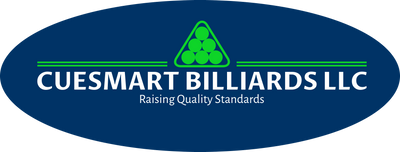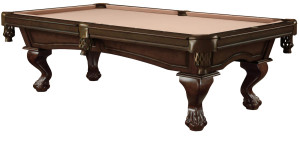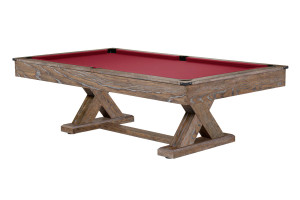Furniture Tables:
- Dust natural wood cabinetry frequently. To restore original luster, use a non-residue-producing dusting agent, such as mild lemon oil.
- Never use glass cleaner on wood surfaces—the ammonia can chemically attack the finish.
- High or low humidity extremes can cause the wood to warp and crack over time. Regulate humidity with a humidifier or dehumidifier accordingly.
- Although the finish is durable, spills should be cleaned immediately to prevent stains or damage.
CLOTH CARE
- Until it is broken-in, a new cloth can considerably affect ball roll. This is normal. Break in your cloth by brushing it as often as possible during the first three months of use.
- Alternate breaking and racking ends of table when possible. Avoid excessively sliding the rack—try to rack in one motion.
- Avoid excessive ball build-up in pockets. If not allowed to drop properly, balls can wear out the cloth around pockets more quickly.
- Chalk is a grinding agent, so avoid chalking your cue over the table.
- The massé, jump shot, etc., can lead to scars or tears in the cloth.
- Always brush the cloth in the same direction toward the end of the table. Never brush in a circular motion.
- Cloth may be vacuumed, in one direction only, using the upholstery attachment.
- To protect your cloth against light, dust and moisture, cover your table when not in use.
- The cloth can wrinkle and become loose if subjected to extreme temperatures or humidity. Regulate both.
POCKETS AND HARDWARE CARE
Pockets:
- Protect pockets from heat and light (sunlight, fireplaces, etc.) and humidity.
- Do not sit or lean on pockets.
- To avoid scuffing when shooting, never slide cue over pocket.
- Examine pockets frequently to ensure no tacks or staples have loosened. Loose tacks can damage pool balls.
- Dust pockets frequently. Clean with a damp cloth and mild soap when needed. Dry with a soft clean cloth.
- Never set anything on pockets—pen ink, nail polish remover, etc., can permanently stain pockets.
- For leather pockets, treat with saddle soap or similar product. When finished, wipe pockets thoroughly to prevent ball and cloth blemishes.
- Avoid storing balls in pockets for extended periods of time. If you do, distribute balls evenly in all pockets.
Hardware:
- Clean table hardware components with a damp cloth. This includes rail caps, cabinet corners, table feet and
leg levelers. - Brushed aluminum components should only be cleaned with Never Dull®. This finish can be scratched and
dulled if other cleaners are used.
ACCESSORIES CARE
Balls:
- Clean balls as needed with a mild household degreaser, such as 409®. Dry and polish with a clean soft cloth.
- Stubborn stains can be removed with a non-abrasive cleanser, such as Soft Scrub®. Dry and polish with a clean soft cloth.
- For a spectacular shine, after cleaning balls, apply paste wax and buff to a bright luster.
Cues:
- Always store cues upright in a wall rack located away from the outside walls, doors and heat vents. Wooden cues are susceptible to warping, never lean cues against a wall or table for any length of time
- Clean cues as needed with a damp rag and mild soap. Dry and polish with a clean soft cloth.
A FEW POOL TABLE CARE “NEVERS”
- Never sit on the pool table, as it could break the seal between the rails and cushions, resulting in dead cushions that produce no ball response.
- Never attempt to move your table. If you do need to move your assembled table, contact your dealer.
- Never sit drinks or food on your table.
- Never place your table in direct sunlight.
- Never use harsh cleaners or chemicals to clean your table.
- Never smoke near your table.
- Never stand on your table, as it could throw it out of level
- Never allow balls to build up in pockets











